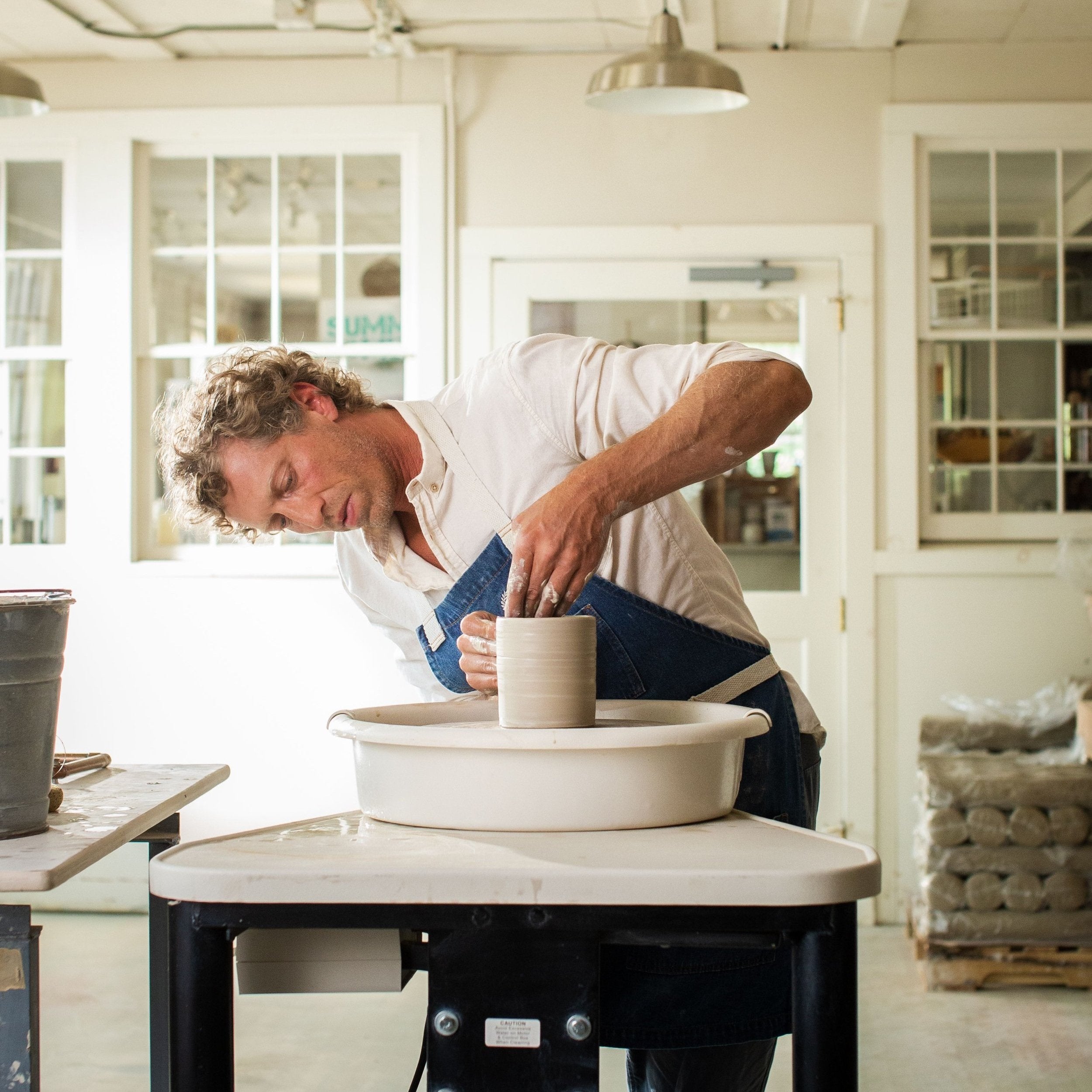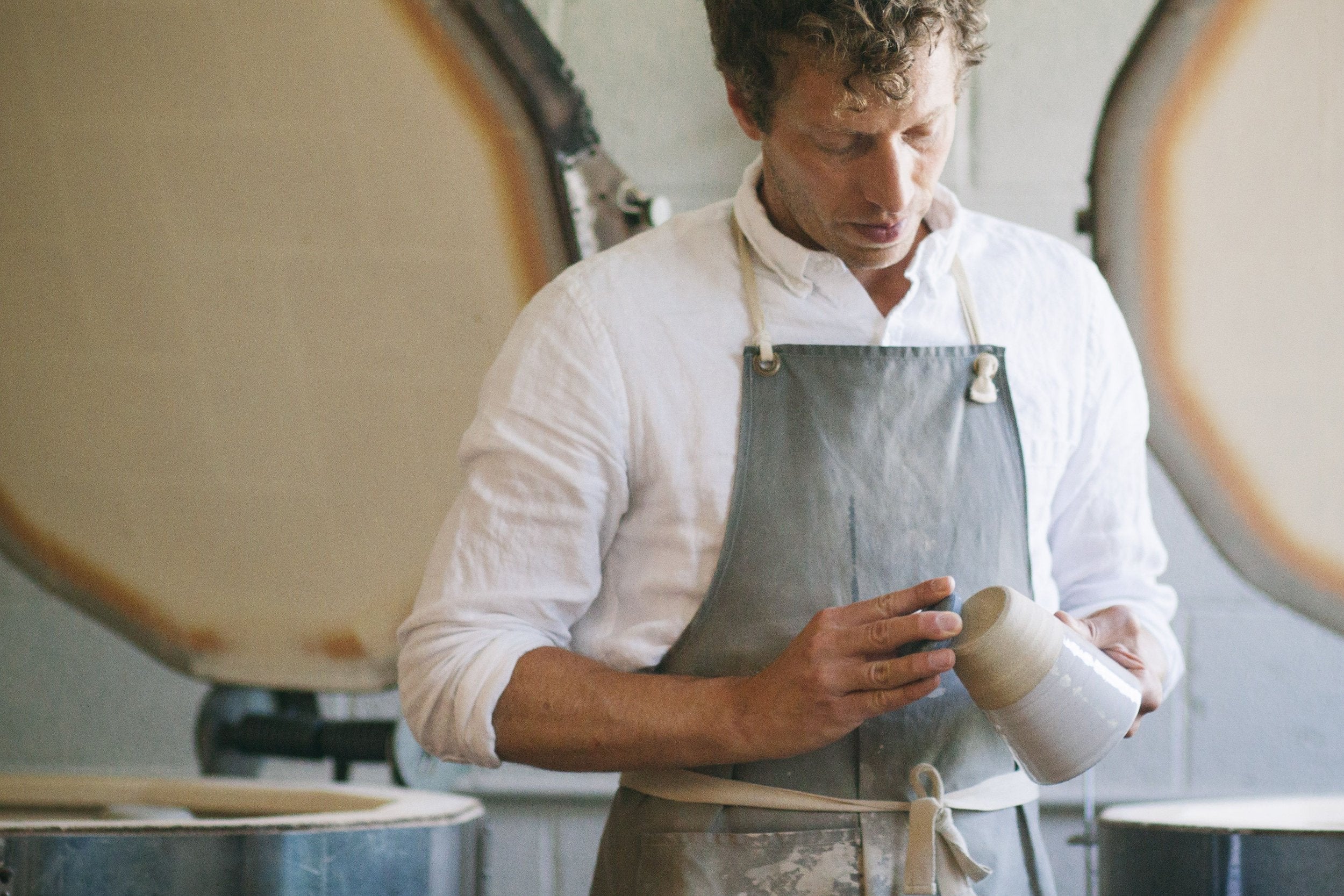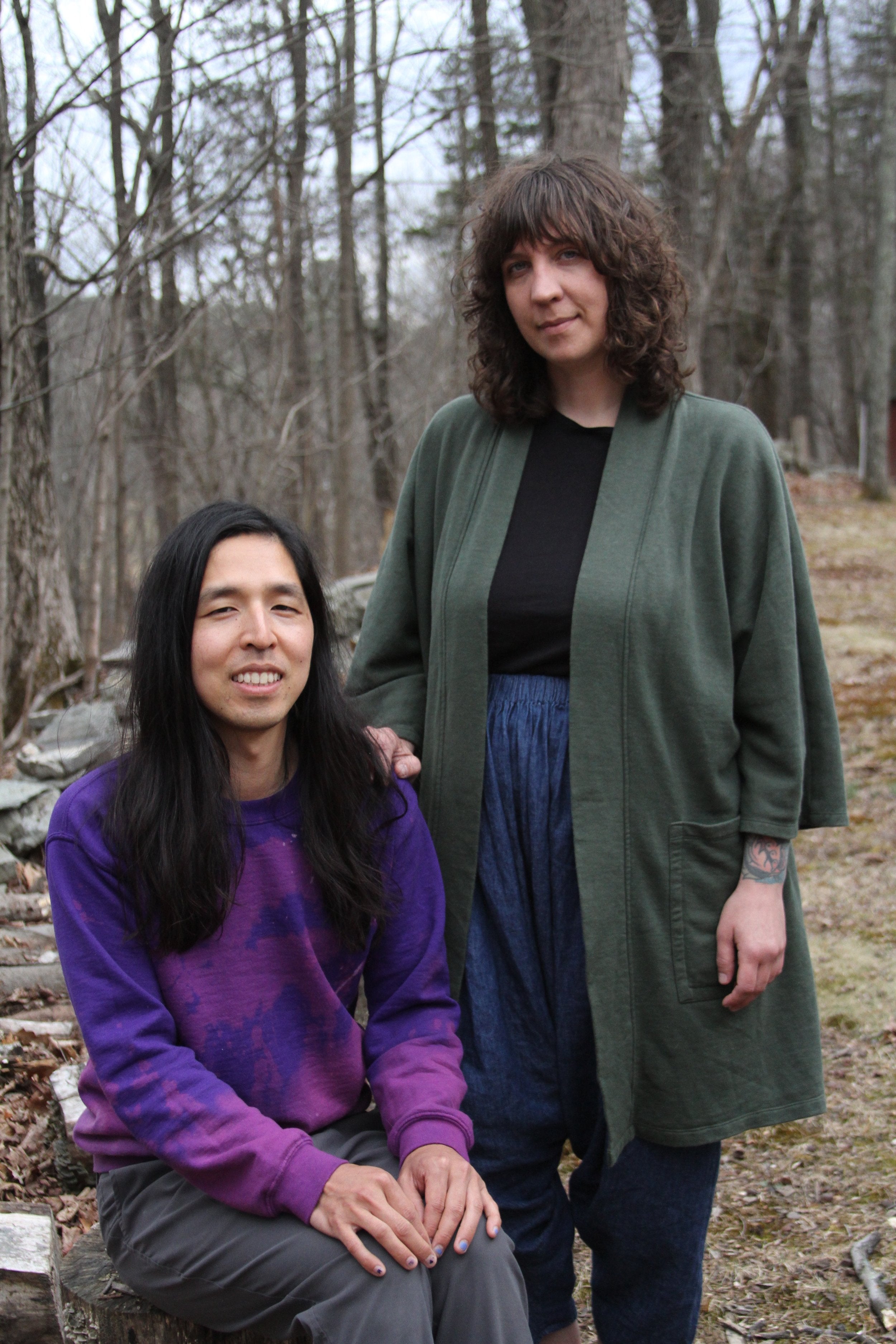Turning the Wheel with James Zilian

Courtesy of Farmhouse Pottery
James Zilian first tried his hand at pottery in ninth grade art class. Of course, he couldn’t have known then that he would go on to found Farmhouse Pottery, an artisan-focused brand that helped spur a renewed appreciation for ceramics in the United States, but he was immediately infatuated with the craft.
“The first time I ever got on the wheel, light shined from the clouds in heaven or something,” James remembers. “It was like I had a magical force. We tend to shake from happiness or therapy or pleasure from things that we excel at or we are good at. We’re magnetized towards them. And the potter’s wheel kept calling me back.”
This pull was so strong that James went on to study ceramics at the Maine College of Art. He then worked at Simon Pearce for nearly a decade before he launched his own ceramics company in Woodstock, Vermont in 2012. Now, Farmhouse Pottery is not only known for its old world-style stoneware, but also its home goods made of wood, glass, and more.
Here, James talks about the special sauce that still sets Farmhouse Pottery apart, even after others have caught on to his trendsetting style.
Mast Journal: What is special about Farmhouse Pottery?
James Zilian: When I started the brand, there wasn't this trend of pottery making. It’s great that a lot of people are practicing throwing and falling in love with it now. There's a lot more appreciation for handmade pottery now than there was 10 years ago. We've helped create a little bit more of a marketplace for handmade pottery. In Japan, ceramics are revered like cars and shoes and jeans are in America. And I'm not taking credit for all of it, or even much of it, but that shift is important to me.
We use the term old world in the modern day a bit. I joke around sometimes about myself being a modern caveman. Making vessels is rooted deep in our DNA as humans and it still surprises me today how far away we got from it, how we mechanized it and scaled it. And so Farmhouse Pottery is going back to that simple craft of making useful, utilitarian vessels in an organic, beautiful, authentic way, where each object truly has the spirit of its maker in it.
We made a commitment to people that they can come to Woodstock, Vermont and collect our pottery. If their dinner plate breaks, they can buy more, or if they want to gift one to someone else, they can. They can come back a year later. It’s something really sustainable, but again, very much an old practice.
MJ: That’s amazing. How did you develop the aesthetic of your pottery?
JZ: First of all, I wanted to use a wheel and not a machine. It used to be that 99 percent of the ceramics in the marketplace were machine-made, which just wasn't interesting to me. Not that you can't make beautiful things with machines, you definitely can, but I like bigger challenges. And I had done some traveling in Europe and I had a few professors in school that informed and inspired me. So this two-toned look with exposed clay came from old European studio pottery. It hadn't really been established in America.
MJ: Totally.
JZ: Quite honestly, you could go to Target or Crate & Barrel now and you’ll see some version of our style. They've moved on from mimicking our actual look and moved onto other types of two-toned pottery. But there was nothing like it in the American marketplace really at all at the time. So it was neat to be on the front end of that and somewhat innovative in a way. What I do is I find old things and modernize them with a pretty typical everyday function. I collect pottery almost every weekend. I find different pieces and different inspirations. I’m on a butter kick now. I've been collecting butter crocs and butter presses.
MJ: That’s so cool!
JZ: That's not overly new. Now, there are a lot of great designers and brands pulling from what used to be and reinventing it or even just putting it out there again. But 10 years ago, the word pottery actually wasn't really being used and neither was the word farmhouse, which of course has blown up thanks to Chip and Joanna Gaines. Both those words are much more common now, which is great. I don't feel as ahead of the trends anymore, but we're an established, classic craft brand.
MJ: Definitely. What type of clay do you use for your pottery?
JZ: It’s stoneware from small American mines, which has some importance to me. I'm an army brat—my father was in the army—so I moved around for 21 years. I grew up in army barracks most of my life, bouncing around, and I lived in Europe for a little while. So I have a pretty strong patriotic thread. We take a lot of pride in the idea that we're working with American earth.
MJ: That’s awesome.
JZ: The formula is made in New England for us. And because of our technique, how we wheel throw, we have very little waste. With typical ceramics manufacturing, a third to half of your material is wasted. We have, in the scheme of things, a much smaller footprint. We use a lot less energy and we have very little waste. And we have real jobs for potters. That wasn't available when I was coming out of art school. You couldn’t be paid to throw pot for someone and have healthcare and have a weekly paycheck and have a 401k. We've created something unique that isn't easy to continue. We thank our customers all the time for keeping our wheels turning.
MJ: That’s a great phrase.
JZ: Many times, I've been told, good luck with that. You're relying on artists. You're not going to be able to stay in business. And I understand what they mean and I lived through some of the challenges of that, but it’s the way I want to do it. And we've created a model that's inspired a lot of other makers around the country.
MJ: There are still very few salaried jobs for artists.
JZ: Yeah, I agree. We’re able to do it because a lot of people love collecting. People love collecting things that are important to them, that resonate with them. My mother collected a lot of pottery from her travels. That was always intriguing to me. I really fell in love with the material. In art school, I did everything from printmaking to jewelry. But with clay, I kept coming back. It's funny. A lot of people feel that way. There’s a pottery-making culture now.
The act of crafting makes people feel good. There's a real sense of accomplishment when you're a potter. Even as a hobbyist, you can spend a day at the wheel and at the end you have all these vessels in front of you. As opposed to in an office, where at the end of the day, you’ve sent a lot of emails. You've done work, but it doesn’t feel the same. And then when someone appreciates your pottery enough to actually open up their wallet and give you money for it. That is, for me, the ultimate high.

Courtesy of Farmhouse Pottery
MJ: It’s clear you have a deep love for clay, but what about the other materials you use at Farmhouse Pottery. How did you expand into wood and glass and linen?
JZ: I like things to be complicated, so I didn't want to just make pottery. There was a farm-to-table movement on the East Coast and it didn't feel like there were products that aligned with the movement. There are a lot of maple syrup makers in Vermont, so one of the first things I did was an actual gift set that was a bottle of syrup and a handmade pitcher. Then I did artisan salt with a salt cellar. A lot of the utility was based on the food and I was interested in the kitchen and table experiences.
So I thought, what other natural materials can I be working with? Of course, wood seemed like a good opportunity. Now, I think we produce more ashwood bowls than almost anyone in the country. And being based in New England, there are a lot of good woodworkers. It was this idea of supporting craftsmen that weren't under our roof, as well. It has been fun building out the collection and working with other artisans. We started pouring candles. Our flatware is mostly made in New York.
MJ: That makes sense. What is your day-to-day like, as founder and CEO?
JZ: I can't remember the last time I made a piece of pottery. It was probably during COVID, when our studio was empty and I had a place to work. As CEO, I’m heavily involved in the product development and the branding and the marketing—that's the most fun for me. I’m very happy I don't have to box up the pots and ship them out anymore because I have a really great group of employees. I work with really nice, like-minded people. It's a unique company.
MJ: How did you come up with the branding for the company? Especially the logo?
JZ: It's funny, that laurel wreath visually seems to span generations. At the time, my five-year- old daughter thought it was pretty and my 70-year-old mother thought it was attractive. And it did have some historical reference. It's an old Greek symbol and that represents success. When you ran a race, you wore a laurel wreath around your head. To me, it had a heritage feeling. And it was both geometric and organic at the same time, which I love. It sort of reflects our pottery. And the typeface just seemed like a really good marriage. It did take a while. It actually wasn't the first logo.
MJ: There are always a few iterations. What do you envision for the future of Farmhouse Pottery? What are you working on next?
JZ: We're going to be evolving our product line in a new direction, which will be nice. We're launching a collection of lighting. That's been exciting for me in so many ways. And for the team. That'll be actually a huge deal for us. We're also going to redesign and build out our flagship store, which is very much already a Vermont destination. People love collecting and getting to see the pottery made, so we're going to add a couple food elements to it. We’re going to open a cafe and possibly a restaurant, as well.
MJ: Wow, that’s so exciting!
JZ: We find that people want to linger more and we need to give them more reasons to do so. So that's a big project. We're in the early design mode of that. We'd like to become more of a serious destination in New England—without going over the top.
MJ: Definitely. Where else can shoppers find Farmhouse Pottery, in addition to online and at the flagship store?
JZ: We’re mostly in smaller boutiques around the country, like Mast Market. Those merchants tend to have customers that are looking for something special. You will find some of our goods at a few larger retailers, like Bloomingdales and Anthropologie, but we keep the line pretty exclusive. I love one-off stores. I love that model. It helps support cottage industry, which is super important. So those are the folks that I want representing us. I’m a huge fan of fewer, better. These objects that we make can be acquired by anyone that can afford them, but I love the idea of them being found and people collecting one or two pieces at a time and them not being disposable. I want them to be passed down for generations. That’s what I’m focused on.
More from The Journal

Feeling Ghia with Mélanie Masarin
Ghia founder Melanie Masarin chats with the Mast Journal about her inspiration, motivation, and road to Ghia.
Read more
Tara & Jeff Put Skin In The Game
Talking values, sourcing, certifications, and sustainable skincare with Tara Pelletier, co-founder of the beloved, vegan body care brand Meow Meow Tweet.
Read more